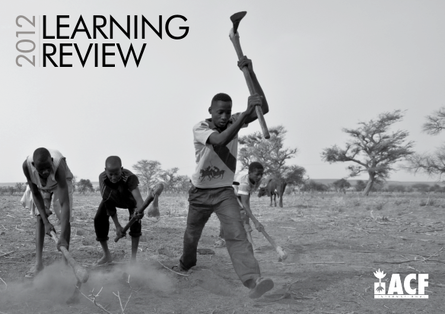
The first time is always easy; there is nothing to be compared to, no expectations, and anything one produces feels distinct and novel. When we first put together the Learning Review last year, we felt free to invent and the only source of pressure was our own desire to push the boundaries of what we could do, say and show based on the information we had collected through evaluations in 2011. The Review was also an opportunity to show what the new ACF Evaluation Policy & Guidelines could do in practice, why it was worth following. In a way, the Learning Review had an easy first ride, but the accolades it received from within and without the organisation suggest that we also got some things right the first time around. This year the pressure was on. For starters, we needed to maintain the identity of the publication, and in particular, its ability to share information for different audiences in different ways. As we wrote the Learning Review 2012, we wanted busy readers to walk away with some key nuggets of information, but we also wanted to provide enough detail and depth to enable other sections to withstand closer (technical) scrutiny. For the Learning Review 2012, we also had to broaden our analysis to include something that we did not have before; data and information from the previous Learning Review. This enabled us to start tracking progress, if not quantitatively, then qualitatively. Compiling the DAC ratings analysis, for example, enabled us to see common themes emerging from the last two years, giving us the confidence to make concrete calls for action to improve performance. For the Best Practices, the ability to draw from two consecutive years means that we are able to also identify specific opportunities for cross-fertilisation between different country offices. Writing the Learning Review gave us the means with which to put individuals and teams in contact with each other to share their experiences in tackling similar challenges and/or using similar approaches. But the 2012 edition was also about venturing into new ground. For the first time, the Learning Review 2012 includes op-ed pieces that are inspired by (but not exclusively linked to) formal evaluative processes. We realised that if the Learning Review is to foster genuine organisational learning we need to diversify the pool of lessons and sources of information from which we draw. For the ELA Unit, the Learning Review has become the vehicle through which to promote and document many of the debates that we feel are taking place (but are not always documented) or that need to take place (but are not always fostered). Extending the scope of the Learning Review in this direction can be risky. But we are prepared to learn as we go along, getting some things right and some things wrong. What we are not prepared to do, however, is to stay in our comfort zone and to just do what we did before. The organisation, from the headquarters to the field offices, demand and deserve more and we are only too happy to comply.